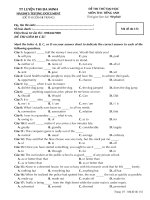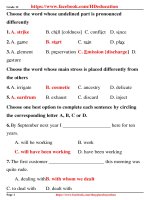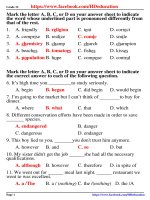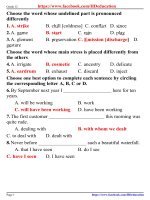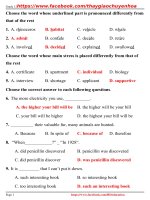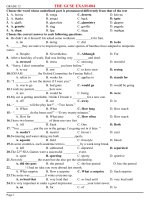- Trang chủ >>
- Đề thi >>
- THPT Quốc Gia
Đề thi tốt nghiệp môn tiếng anh
Bạn đang xem bản rút gọn của tài liệu. Xem và tải ngay bản đầy đủ của tài liệu tại đây (162.29 KB, 7 trang )
Trang 1/7 - Mã đề thi 132
TT LUYỆN THI ĐA MINH
HAI JIM’S TESTING DOCUMENT
(ĐỀ THI GỒM 8 TRANG)
ĐỀ THI THỬ ĐẠI HỌC
MÔN THI: TIẾNG ANH
Thời gian làm bài: 90 phút
Họ, tên thí sinh: :
Số báo danh : :
Điện thoai tư vấn thi : 0984467000
Mã đề thi 132
ĐỀ THI GỒM 80 CÂU
Mark the letter A, B, C, or D on your answer sheet to indicate the correct answer to each of the
following questions.
Câu 1: Suppose I _____ half the money I owe you. Would that satisfy you?
A. will pay B. would pay C. pay D. paid
Câu 2: In the US, _____ the states but Hawaii is an island.
A. neither of B. none of C. not any D. all of
Câu 3: The policeman _____ me off with a warning as it was Christmas.
A. sent B. gave C. let D. set
Câu 4: Good health enables people to enjoy life and have the _____ to achieve their goals.
A. opportunity B. occasion C. chance D. situation
Câu 5: Up _____ when it saw its master.
A. did the dog jump B. jumped the dog C. the dog jumped D. does the dog jump
Câu 6: _____ anything suspicious arise; please let me know at once.
A. Should B. Would C. Can D. Did
Câu 7: It is _____ who _____ wrong.
A. me / is B. I / am C. me / am D. I / is
Câu 8: What I actually earn bears no _____ to all my needs.
A. connection B. association C. relation D. link
Câu 9: I was in a quandary _____ what to say.
A. owing to B. of C. as to D. for
Câu 10: It won’t _____ matter if you arrive a few minutes late.
A. greatly B. grandly C. considerably D. largely
Câu 11: This computer game is really out of the _____
A. normal B. usual C. average D. ordinary
Câu 12: They said that the blue cheese was very tasty, but the smell put me _____.
A. of B. in C. to D. off
Câu 13: Once you have started something, you ought to see it _____ to the end.
A. to B. through C. for D. in
Câu 14: The curriculum at the public school is as good _____ of any private school.
A. as or better than that B. or better than
C. as or better than D. as or better that
Câu 15: Alone in a deserted house, he was so busy with his research work that he felt _____ lonely.
A. nothing but B. everything but C. anything but D. all but
Câu 16: When he realized the police had spotted him, the man _____ the exit as quickly as possible.
A. made up B. made out C. made off D. made for
Câu 17: Traffic is being _____ from the High Street while the water main is under repair.
A. subverted B. averted C. diverted D. perverted
Trang 2/7 - Mã đề thi 132
Câu 18: Either you or Daisy _____ the vase. There is no one else in the room.
A. has been broken B. have been broken C. has broken D. have broken
Câu 19: Old Mr. Brown’s condition looks very serious and it is doubtful if he will _____.
A. pull up B. pull back C. pull through D. pull out
Câu 20: When _____ a European, we should stick to the last name unless he suggests that we use his
first name.
A. talking B. speaking C. discussing D. addressing
Câu 21: Of the two drivers, Mr Blake is very experienced and _____
A. the others are not B. another is not C. the other is not D. other is not
Câu 22: The jury _____ her compliments on her excellent knowledge of the subject.
A. said B. made C. gave D. paid
Câu 23: Alice Freeman, _____ president of Wellesley College at the age of 27, is one of the youngest
presidents in history.
A. who is appointed B. who was appointed
C. that is appointed D. whom has been appointed
Câu 24: _____ was caused by breathing impure air was once a common belief.
A. For malaria B. That malaria C. Why malaria D. Malaria
Câu 25: Don’t throw that away - it might _____.
A. come in handy B. come in use C. come into handy D. come into use
Câu 26: - “It is raining outside.” - “_____”
A. So it is. B. Is it so? C. So it does. D. So is it.
Câu 27: Would you rather _____ the lunch, if you feel tired?
A. I cook B. cooking C. cook D. I cooked
Câu 28: The police are _____ the town for the missing vehicle.
A. looking B. investigating C. seeking D. combing
Câu 29: We couldn’t stay long, so we only wished Mark many happy _____ for his birthday and
hurried to the airport.
A. days B. returns C. regards D. moments
Câu 30: The union and the management are _____ dispute over working conditions.
A. in B. for C. on D. under
Read the following passage and mark the letter A, B, C, or D on your answer sheet to indicate
the correct word for each of the blanks from 31 to 40.
SPORT PHOTOGRAPHY
Sport as a spectacle and photography as a way of recording action have developed together. At
the turn of the 20
th
century, Edward Muybridge was experimenting with photographs of movement.
His pictures of a runner (31)_____ in every history of photography. Another milestone was when the
scientist and photographer Harold Edgerton (32)_____ the limits of photographic technology with his
study of a (33)_____ of milk hitting the surface of a dish. Another advance was the development of
miniature cameras in the late 1920s, which made it possible for sports photographers to (34)_____
their cumbersome cameras behind.
The arrival of television was a significant development in the transmission of sport. Paradoxically,
it was of benefit to still photographers. People who watched a sports event on TV, with all its
movement and action, (35)_____ the still image as a reminder of the game.
Looking back, we can see how (36)_____ sports photography has changed. (37)_____ sports
photographers were as interested in the stories behind the sport as in the sport itself. Contemporary
Trang 3/7 - Mã đề thi 132
sports photography (38)_____ the glamour of sport, the colour and the action. But the best sports
photographers today do more than simply tell the story of the event, or make a (39)_____ of it. They
(40)_____ in a single dramatic moment the real emotions of the participants emotions with which
people looking at the photographs can identify
Câu 31: A. feature B. exhibit C. demonstrate D. show
Câu 32: A. enlarged B. prolonged C. extended D. spread
Câu 33: A. drip B. drop C. splash D. dash
Câu 34: A. keep B. leave C. lay D. put
Câu 35: A. chose B. pointed C. valued D. cheered
Câu 36: A. extremely B. severely C. highly D. radically
Câu 37: A. First B. Early C. Initial D. Primary
Câu 38: A. outlines B. emphasizes C. forms D. signals
Câu 39: A. store B. preservation C. record D. mark
Câu 40: A. capture B. seize C. grasp D. secure
Mark the letter A, B, C, or D on your answer sheet to indicate the sentence that is closest in
meaning to each of the following questions.
Câu 41: It won’t be long before her husband comes back.
A. There’s likelihood that her husband won’t return soon.
B. Possibly, her husband won’t come back as soon as he wants.
C. Her husband will come back later than planned.
D. Her husband will be returning quite soon.
Câu 42: The president was reported to have been a heart attack.
A. The president was reported to suffer a heart attack.
B. People say that the president had suffered a heart attack.
C. It was reported that the president had suffered a heart attack.
D. People reported the President to suffer a heart attack.
Câu 43: Impressed as we were by the new cinema, we found it rather expensive.
A. We were very impressed by the new cinema, but found it rather expensive.
B. The new cinema was more expensive than we expected,
C. We weren’t as much impressed by the new cinema’s look as its coast.
D. We were not impressed by the new cinema at all because it looked rather expensive.
Câu 44: Their chances of success are small.
A. It’s very likely that they will succeed.
B. They won’t have any chance of being successful.
C. They will definitely be successful.
D. It’s not very likely that they will succeed.
Câu 45: At no time did the two sides look likely to reach an agreement.
A. If the two sides had had time, they would have reached an agreement.
B. The two sides never look like each other.
C. The two sides never looked likely to reach an agreement.
D. The two sides had no time to reach an agreement.
Câu 46: She locked the door so as not to be disturbed.
A. She locked the door so that not to be disturbed.
Trang 4/7 - Mã đề thi 132
B. She locked the door in order that she wouldn’t be disturbed.
C. She locked the door to be not disturbed.
D. She locked the door for her not to be disturbed.
Câu 47: They don’t know much knowledge of the jobs of their choice.
A. They have little knowledge of the jobs of their choice.
B. They have a few knowledge about the jobs of their choice.
C. They have few knowledge of the jobs of their choice.
D. They don’t have much knowledge of the jobs of their choice.
Câu 48: Hardly are appeals allowed against the council’s decisions.
A. It’s too hard for the council to allow appeals against its decisions.
B. The council always allows appeals against its decisions.
C. Allowing appeals against its decisions is not good.
D. The council rarely allows appeals against its decision.
Câu 49: He talked about nothing except the weather.
A. He said he had no interest in the weather.
B. He talked about everything including the weather.
C. He had nothing to say about the weather.
D. His sole topic of conversation was the weather.
Câu 50: When the unemployment rate is high, the crime rate is usually also high.
A. The unemployment rate is as high as the crime rate.
B. The higher the unemployment rate is, the higher the crime rate is.
C. The unemployment rate and the crime rate are both higher
D. The high rate of unemployment depends on the high rate of crime.
Read the following passage and mark the letter A, B, C, or D on your answer sheet to indicate
the correct word for each of the blanks from 51 to 60.
THE OLDEST BUILDING
On a hillside at Chichibu, north of Tokyo, Japanese archeologists have uncovered the remains
of what is believed to be the world’s oldest (51)_____ structure. The structure was discovered during
the construction of a park. The site has been dated to half a million years ago, (52)_____ to a report
in a scientific magazine. The structure consists of what appear to be 10 post holes, which form two
(53)_____ pentagons. These could be the remains of two huts. A (54)_____ of stone tools were also
found (55)_____ around the site. It is believed that the shelter was built by an (56)_____ ancestor of
humans, Homo erectus, who is known to have used stone tools. The remains of these huts could
help to (57)_____ how Homo erectus lived and hunted. What is not known is whether these
structures were temporary or more permanent shelters. But they do (58)_____ us that hominids
could (59)_____ of using technology to organize things. They had the idea of actually making a
structure -a place where they could sleep. It (60)_____ the mental capacity to distinguish between
inside and outside. Before this new discovery the oldest remains of a structure were those at Terra
Amata in France, from around 200,000 to 400.000 years ago.
Câu 51: A. unnatural B. fake C. synthetic D. artificial
Câu 52: A. saying B. mentioning C. following D. according
Câu 53: A. shapeless B. uneven C. irregular D. odd
Câu 54: A. sum B. figure C. few D. number
Câu 55: A. splashed B. extended C. scattered D. thrown
Trang 5/7 - Mã đề thi 132
Câu 56: A. ancient B. old C. elderly D. antique
Câu 57: A. explain B. argue C. inform D. answer
Câu 58: A. show B. illustrate C. display D. demonstrate
Câu 59: A. imagine B. conceive C. think D. plan
Câu 60: A. means B. symbolizes C. stands for D. represents
Câu 61: Choose the word whose stress pattern is different from that of the other three.
A. locality B. newspaper C. influence D. prejudice
Câu 62: Choose the word whose stress pattern is different from that of the other three.
A. popularity B. beneficial C. continental D. preparatory
Câu 63: Choose the word whose underlined part is pronounced differently from that of the
other three.
A. layer B. betrayer C. sprayer D. prayer
Câu 64: Choose the word whose stress pattern is different from that of the other three.
A. amateurish B. bureaucracy C. amplifier D. humanism
Câu 65: Choose the word whose underlined part is pronounced differently from that of the
other three.
A. occasion B. confusion C. dimension D. conclusion
Mark the letter A, B, C, or D on your answer sheet to show the underlined part that needs
correction.
Câu 66: The little boy was lost and spoke in an afraid voice . No error
A B C D
Câu 67: Both sides have at last agreed with a United Nations plan to end the fighting. No error
A B C D
Câu 68: Pupils sometimes suffer in a test when the questions are written in a language
A B
which is not his mother tongue. No error
C D
Câu 69: The country’s chief export is oil and gas . No error
A B C D
Câu 70: Jim is very good with his hands . No error
A B C D
Read the following passage and mark the letter A, B, C, or D on your answer sheet to
indicate the correct answer to each of the questions from 71 to 75.
It was a Devonshire farmer called Ben Jesty, who lived more than two hundred years ago, who began
the development of vaccination as a method of protecting people against many diseases. In 1774
there was a severe outbreak of the disease smallpox in his local village. He already knew of the
traditional belief that an attack of cowpox gave people protection against smallpox and he saw proof
of this at this time. Two of his farm workers had previously developed cowpox sores on their hands
through milking infected cows and had then nursed their own families through the smallpox outbreak
without catching the disease themselves.
Trang 6/7 - Mã đề thi 132
Jesty had already had cowpox, but his wife and their two young children had not. Concerned for
their safety, he scratched their arms with a large needle and then put fluid from the cowpox sores on
an infected cow into these scratches. Although the Jesty family were criticized by local people who
thought that this experiment' was morally wrong, they never caught smallpox.
But the real breakthrough came some twenty years later in 1796 when Edward Jenner, an English
country doctor, made the first scientific approaches to the subject of protection against disease by
vaccination methods. His experiments proved the value of vaccination with material from cowpox
sores, and he also found that using material from an infected human on another human produced
only a small sore at the spot where the treatment had been carried out and very few other signs of
the disease.
It was at about this time, too, that the now familiar name 'vaccine' for the material used in the
process of 'vaccination' - from the Latin name for cowpox, 'vaccinia' (the Latin 'Vacca' means ‘cow'! -
came into use.
Tenner's vaccination techniques spread across the world faster than the disease itself. Napoleon
had his troops vaccinated and in Russia the first child to be vaccinated was given the name 'Vaccinof'.
President Jefferson of the United States said in a letter to Tenner, 'Future nations will know by history
only that the terrible disease of smallpox existed and that it has been destroyed by you.' Forward-
looking words indeed! In 1980, the World Health Assembly officially declared that smallpox had
completely disappeared from the world.
Câu 71: What important thing did Ben Jesty realize?
A. Cows did not catch smallpox.
B. There was no difference between cowpox and smallpox.
C. Farm workers often caught cowpox.
D. people who had had cowpox did not catch smallpox.
Câu 72: The local people thought that what Jesty did was
A. sensible. B. foolish. C. scientific. D. wicked.
Câu 73: Why did Edward Jenner become famous ?
A. He started the development of vaccination.
B. He proved that vaccination worked.
C. He travelled round the world vaccinating people.
D. He persuaded most people in Europe to be vaccinated.
Câu 74: Jenner's techniques were
A. adopted very rapidly throughout the world.
B. successful in getting rid of smallpox in his lifetime.
C. too advanced for people to accept at the time.
D. neglected for almost two hundred years.
Câu 75: Why did the word 'vaccine' come into use?
A. 'Vaccine' was the traditional country name for smallpox.
B. The earliest 'vaccine' was used to protect cows.
C. The first child to be treated with a 'vaccine' was called Vaccinof.
D. The Latin name for cowpox was 'vaccinia'.
Read the following passage and mark the letter A, B, C, or D on your answer sheet to
indicate the correct answer to each of the questions from 76 to 80.
Trang 7/7 - Mã đề thi 132
Airline pilots have high social status and earn a great deal of money. Air hostesses have an uncertain
status and earn little. For those recently qualified, the basic pay in some airlines is as little as £300 a
month, and there are always some who will describe them as 'glorified waitresses in the sky'. This is
little to balance against the possibility of a hijack or a disaster.
So why do they do it?
I went to see Diane Humphreys. Senior Hostess with Dan-Air at Manchester Airport, to try to find
the answer to this question. Mrs Humphreys is responsible for all Dan-Air's cabin staff based at the
airport and is also involved in their selection. She has had the job for 16 years. Before that she was an
ordinary air hostess for six years.
One reason why air hostesses don't get over-anxious about flying may be that they're so busy,
before, during and after a flight. I asked Mrs Humphreys to tell me what a typical summer timetable
for a hostess would be. She said that four or five flights a week during die summer is not uncommon.
'On a Monday morning, a hostess might have an early morning flight; perhaps at 1 a.m. She has to
check in 1/2 hours before the flight - maybe at half past five - that might mean leaving home at 4
a.m. Before the flight, hostesses have to prepare the cabin and toilets and make sure that the food
and drinks are aboard. Dan-Air don't do long-distance flights, just short or medium distance ones,
and so there are no overnight stopovers unless weather conditions prevent take-off or landing, or the
plane develops technical problems. There's a 45-minute turn-around interval, when the hostesses
have to prepare the plane for the return flight. Depending on where you're flying, this can make it a
12-hour day; with delays it can even be 16 hours.
During the flight you've got no time to relax - the safety instructions have to be demonstrated and
the food and drinks served. You're always busy. So one day you might have an early morning light;
the next an afternoon flight; the day after you might be on relief duty and have to be ready to work if
someone else becomes ill or there is an emergency. This means that you have to stay near a phone
all the time and be no more than an hour and a half from the airport.'
Câu 76: In her job Diane Humphreys
A. is in charge or Dan-Air's air hostesses world-wide.
B. looks after aircrews when they are in Manchester.
C. helps with the appointment of Manchester's Dan-Air cabin staff.
D. supervises ail Manchester Airport staff.
Câu 77: In summer Dan-Air's hostesses usually work
A. six days a week of 12—16 hours each. B. relief days after night flights.
C. alternate days on and off duty. D. completely variable hours each week.
Câu 78: When can air hostesses relax?
A. when the plane is in the air B. never at all
C. when the plane has landed D. before a flight takes off
Câu 79: What does being on relief duty involve?
A. remaining near a telephone all the time
B. staying at the airport for the day
C. preparing for a night flight during the day
D. telephoning the airport every 1 1/2 hours
Câu 80: According to this passage, the job of an air hostess is
A. glamorous B. boring C. tiring D. well paid
HẾT

